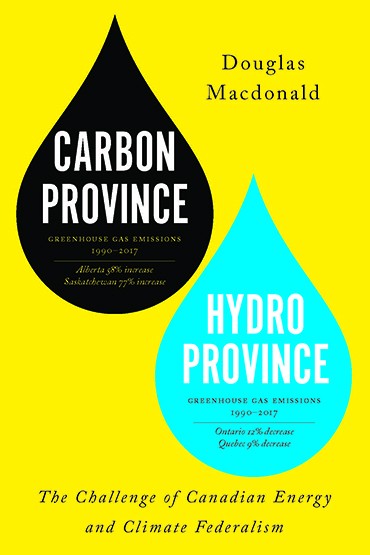Senior Lecturer Emeritus, School of the Environment

Research Area
Canadian environmental policy and politics, with a focus upon national climate-change policy; interdisciplinary environmental studies, in terms of the evolution of the human-nonhuman relationship since Homo sapiens first appeared.
Current Research Interests
1) Canadian federal-provincial climate and energy policy

Carbon Province, Hydro Province: The Challenge of Canadian Energy and Climate Federalism
Published by University of Toronto Press, March 10, 2020.
In the October 21, 2019 federal election, two-thirds of voters supported parties calling for more effective action on climate change. The premiers of Alberta and Saskatchewan, however, point to their very real economic distress, to the equally real problem of western alienation, and demand federal action on pipelines and project approvals. Such action might well provide jobs, but it will also, unfortunately, increase western greenhouse gas emissions, which are already overwhelming reductions made in the east. Must we choose between national unity and climate action? Carbon Province, Hydro Province outlines a path through these clashing imperatives.
Forthcoming: Climate Change Policy with Dr. Mark Winfield, in Herman Bakvis and Grace Skogstad, editors, Canadian Federalism: Performance, Effectiveness, and Legitimacy, Fourth Edition, Don Mills: Oxford University Press, 2020.
Forthcoming: Canada and the Climate Policy Dilemma with Dr. Debora L. VanNijnatten, in James Bickerton and Alain-G. Gagnon editors, Canadian Politics Seventh Edition. Toronto: University of Toronto Press, 2020.
The need for agreement on equitable sharing of emission reduction costs: A fifth Working Group should be added to the Vancouver Declaration process Submission to the Federal-Provincial-Territorial Working Groups, with Asya Bidordinova, doctoral candidate, Geography, July 25, 2016.
Climate Change Policy in Debora L. VanNijnatten, ed. Canadian Environmental Policy and Politics: The Challenges of Austerity and Ambivalence. Don Mills: Oxford University Press, 2016.
![]() The challenge of Canadian climate and energy federalism: Explaining the collapse of the Canadian National Climate Change Process.pdf with Benjamin Donato-Woodger and Stefan Hostetter. Paper delivered at the annual meeting of the Canadian Political Science Association June, 2015.
The challenge of Canadian climate and energy federalism: Explaining the collapse of the Canadian National Climate Change Process.pdf with Benjamin Donato-Woodger and Stefan Hostetter. Paper delivered at the annual meeting of the Canadian Political Science Association June, 2015.
![]() Allocating Canadian Greenhouse Gas Emission Reductions Amongst Sources and Provinces.pdf. SSHRC-funded research project, with European and Canadian colleagues. 2013.
Allocating Canadian Greenhouse Gas Emission Reductions Amongst Sources and Provinces.pdf. SSHRC-funded research project, with European and Canadian colleagues. 2013.
2) Evolution of the human-nonhuman relationship
Each of the disciplines upon which interdisciplinary environmental studies is based rests upon a limited number of core theoretical assumptions and conceptualizations. As interdisciplinary environmental studies is being established within teaching and research, is it generating its own core theoretical approaches? Examining the full scope of the way humanity has interacted with everything else over the past two hundred thousand years may help develop environmental studies theory. The focus is upon such concepts as Human Niche Construction and the human-nonhuman balance of physical power, as influenced by the evolution of human organization and coordination.
![]() Attempting to understand the ecological crisis: Human capacity, self-interest and moral restraint.pdf. Paper delivered at the annual meeting of the Environmental Studies Association of Canada, June, 2015.
Attempting to understand the ecological crisis: Human capacity, self-interest and moral restraint.pdf. Paper delivered at the annual meeting of the Environmental Studies Association of Canada, June, 2015.
Other Publications
Management of Distributive Impacts Impeding Expansion of Interprovincial Hydro-electricity Transmission with Matt Lesch, Journal of Canadian Studies, Vol 49, No 2 Fall 2015.
Business and Environmental Politics in Canada. Peterborough: Broadview Press, 2007. Awarded the Canadian Political Science Association 2008 Donald Smiley Prize for “the best book published in English or French in the field relating to the study of government and politics in Canada in 2007″.


